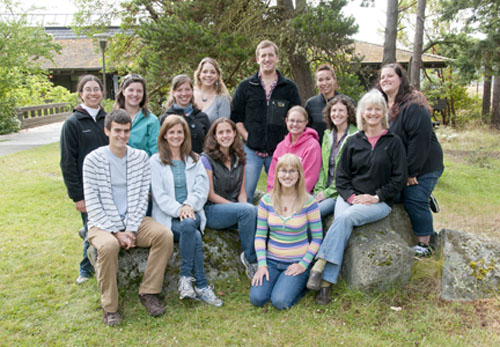NSF Sponsored Ecology of Infectious Marine Disease Course
Drew Harvell, Ph.D.
Ecology of Infectious Marine Disease was taught for a second time at the Labs this summer. The course's success in 2010, allowed us to provide NSF scholarships to graduate students from around the country, associated with a new Research Coordination Network grant in Evaluating the impacts of a changing ocean on management and ecology of infectious marine disease awarded to Dr. Drew Harvell, Dr. Carolyn Friedman and colleagues. This course was also a collaboration with SAFS, through the involvement of two faculty, Dr. Carolyn Friedman and Dr. Steven Roberts and the loan of important molecular equipment.
This summer, the course focused on three projects where disease is linked with climate change.
1) Labyrinthulid infections of seagrass are suspected in other locations to get worse in warming conditions. Taking advantage of Dr. Sandy Wyllie-Echeverria's seagrass monitoring program and results with the presence of Labyrinthula zosterae, the class developed PCR and histological tests to aid their field assays of infections in the San Juans.
2) Vibrio tubiashi has caused large losses of oyster larvae in hatcheries and natural populations. Working with Dr. Friedman's student Elene Dorfmeier, the class was able to test the effects of high OA (2000 ppm CO2) on infections of oyster larvae and also test for probiotic effects of a bacterium, Aeromonas.
3) The protist QPX has caused large losses of clams on the east coast and is thought to be sensitive to increasing temperatures. Under the direction of Dr. Steven Roberts, students learned Bioinformatics tools to unravel the puzzle of how QPX gene expression changes at different temperatures.

Photo by Kathleen Ballard

